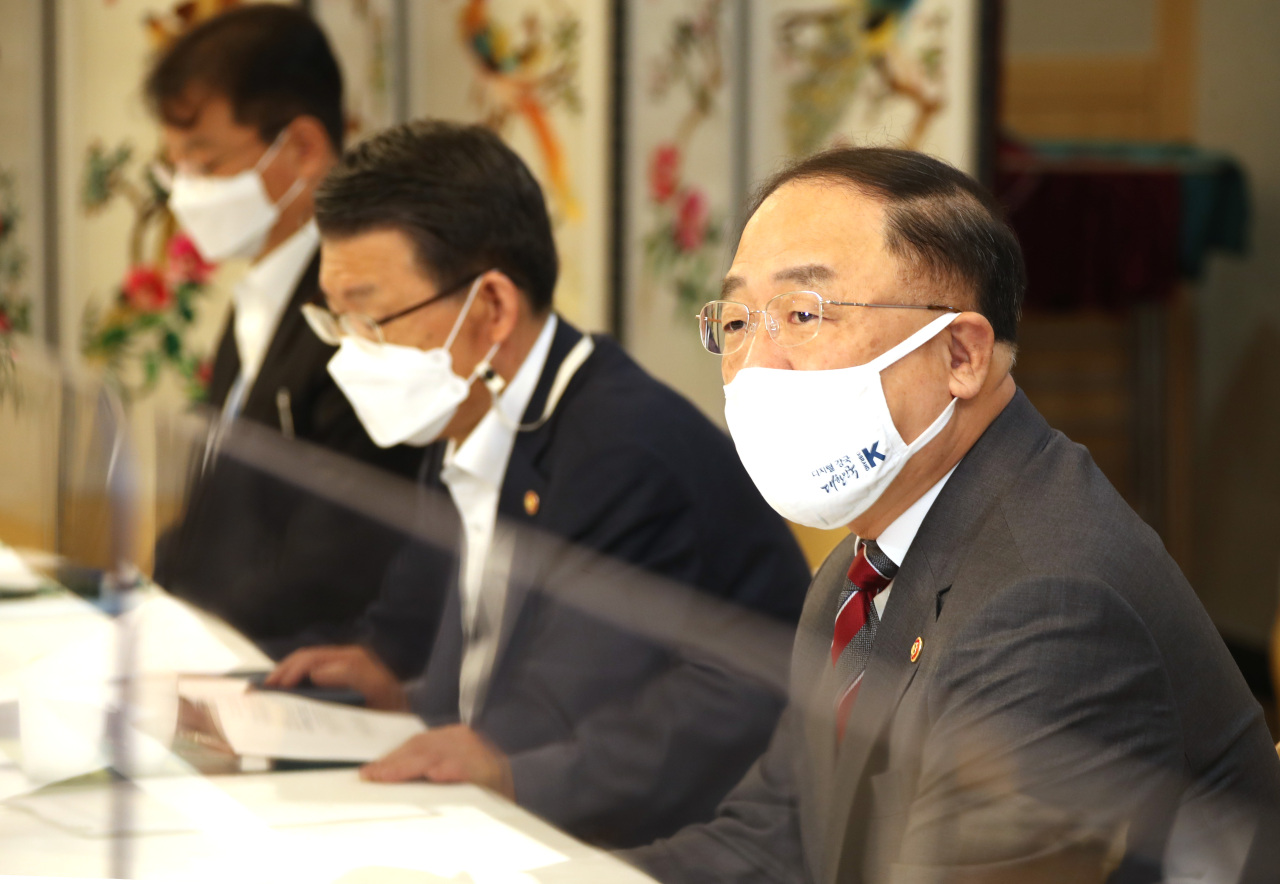S. Korea to lower market threshold for newlyweds, first-time homebuyers
Up to 92% of first-time buyers will be eligible for preferential housing applications
By Bae HyunjungPublished : Oct. 14, 2020 - 17:03

South Korea will alleviate the requirements to qualify for housing subscriptions, in a move to lower the market entry barrier for young non-homeowners, Deputy Prime Minister and Finance Minister Hong Nam-ki said Wednesday.
The government expects that the revised set of rules will allow up to 92 percent of newlyweds and first-time homebuyers to apply for newly built houses.
“(The government) will seek to further alleviate the income rule in the special housing supply for first-time buyers, so that more end users may have a chance to own their own home,” the fiscal chief said in a real estate policy meeting at Seoul Government Complex.
Currently, the government requires construction firms to allocate a designated amount of new homes to newlyweds and first-time homebuyers in a lottery process. In the case of public construction projects, applicants should earn the average income or less in order to apply for these homes.
For private complexes, 75 percent of the housing supply is allocated under the same rule as public housing, while the remaining 25 percent is only open for those earning up to 120-130 percent of the average income.
The lottery process was seen as favorable for larger families with additional points, instead of first-time buyers.
Under the rule, 70 percent of all housing supply -- public and private alike -- will have new income rules applied, while the remaining 30 percent will be open to higher earners.
The new rules mean that a working couple with one child who reside in Seoul and who earn a combined yearly income of 106.68 million won will be eligible to apply for a newly constructed apartment subscription.
Also, the changed rule is expected to add 81,000 new units in public construction and 63,000 in private construction.
Addressing the recently soaring jeonse rates, the minister vowed to closely monitor the market, while adding that the new tenant protection legislation will soon have the intended price stabilizing impact.
Jeonse is a home lease system unique to South Korea, in which tenants pay a lump sum deposit instead of a monthly rent.
In July this year, three new laws related to housing leases took effect, allowing tenants to extend their contracts for up to four years and to keep the maximum rent increase at 5 percent upon contract renewal.
These laws intended to protect the tenants’ rights and to stabilize their living conditions, but also had some side effects as home owners began to avoid putting their properties on the market for jeonse.
“We feel heavy-hearted that many continue to face trouble in finding a jeonse house,” Hong said.
But he added that the jeonse market has recently started to show signs of stabilizing, citing the increasing number of jeonse renewals for government-insured lease contracts.
“I expect that the tenants’ residential stability will improve once the system (introduced by the new lease laws) settles down in the market.”
Meanwhile, the minister himself is set to find a new home by January next year as his landlord notified his intention to move in. Hong currently resides in an apartment in Mapo-gu, western Seoul.
Under the revised rules, tenants may demand another two year jeonse contract extension, but have to move out if the owner or owner’s close family members decide to move in.
By Bae Hyun-jung (tellme@heraldcorp.com)








![[Graphic News] More Koreans say they plan long-distance trips this year](http://res.heraldm.com/phpwas/restmb_idxmake.php?idx=644&simg=/content/image/2024/04/17/20240417050828_0.gif&u=)
![[KH Explains] Hyundai's full hybrid edge to pay off amid slow transition to pure EVs](http://res.heraldm.com/phpwas/restmb_idxmake.php?idx=644&simg=/content/image/2024/04/18/20240418050645_0.jpg&u=20240419100350)





![[From the Scene] Monks, Buddhists hail return of remains of Buddhas](http://res.heraldm.com/phpwas/restmb_idxmake.php?idx=652&simg=/content/image/2024/04/19/20240419050617_0.jpg&u=20240419175937)

![[KH Explains] Hyundai's full hybrid edge to pay off amid slow transition to pure EVs](http://res.heraldm.com/phpwas/restmb_idxmake.php?idx=652&simg=/content/image/2024/04/18/20240418050645_0.jpg&u=20240419100350)

![[Today’s K-pop] Illit drops debut single remix](http://res.heraldm.com/phpwas/restmb_idxmake.php?idx=642&simg=/content/image/2024/04/19/20240419050612_0.jpg&u=)